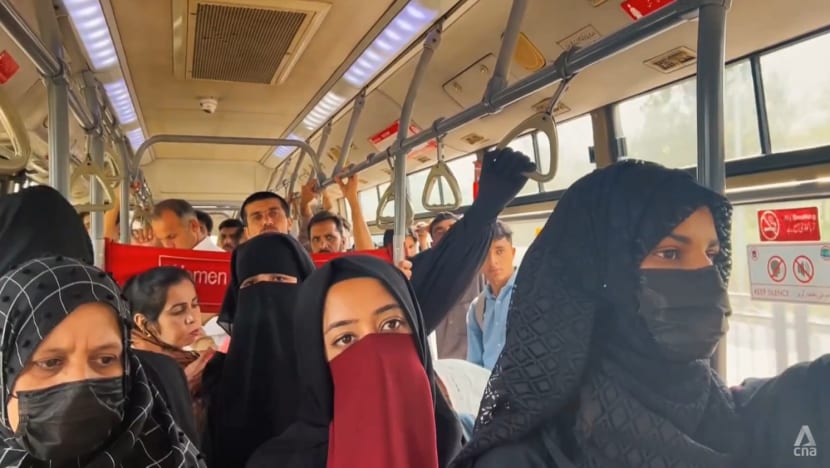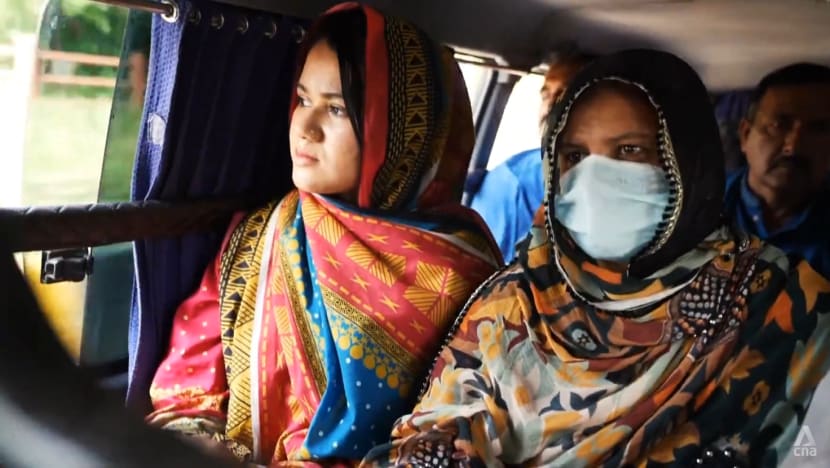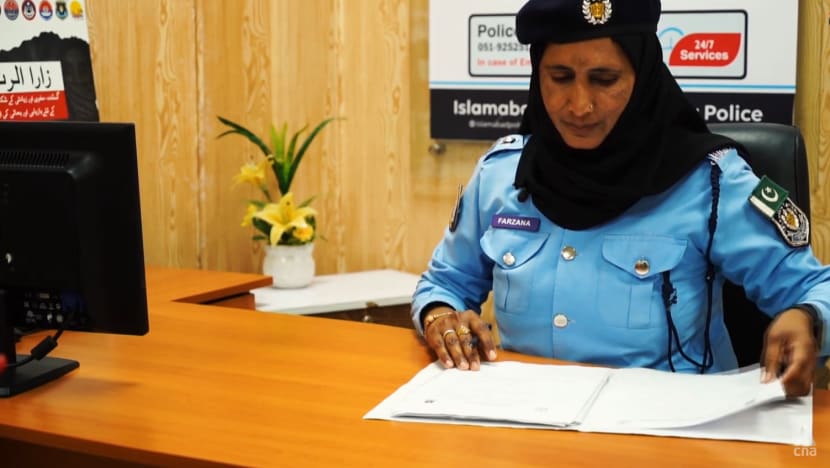Traumatised on public transport: Women in Pakistan experience harassment on their daily commutes
In line with the International Day for the Elimination of Violence against Women, CNA looks at some of the challenges females face in Pakistan.

Physical and sexual harassment on public transportation is a problem that women in Pakistan face during their daily commutes.

This audio is generated by an AI tool.
ISLAMABAD: Ms Amna Hafeez depends on a van service to take her from where she lives in the outskirts of Pakistan capital Islamabad to her office.
The journey is steeped in anxiety for the 23-year-old sales representative.
While there are seats designated for women, drivers and conductors frequently disregard them, overcrowding the vehicles and forcing women to squeeze among male passengers.
"When there aren't enough female passengers on the route, they try to fit 10 to 12 male passengers on the same bus,” Ms Hafeez told CNA.
The service, run by independent operators, goes to areas where public transportation is not available.
In a country where physical and sexual harassment during commutes is rampant, the cramped conditions leave women vulnerable.
For instance, a study released in October on the experiences of female users of the of rapid public buses in one of Pakistan’s biggest cities, Peshawar, found that more than half of those under 18 years old experienced harassment during their journey.
Ms Hafeez has faced the same.
“We have to travel among men who are constantly making unwanted advances towards female passengers, often expecting something in return,” she said.
The harassment she faces has gone beyond the confines of the vehicles - she was once followed.

“As I boarded the van, two men on a bike started chasing me. I noticed them following me through the side mirrors of the van. I was scared, so I didn’t get out at my stop,” she said.
However, Ms Hafeez has no choice but to continue relying on such transport as the sole breadwinner of her family.
In a country where 40 per cent of citizens live below the poverty line, public transport is a lifeline for those like her.
CHALLENGES IN REPORTING CASES
Compounding the trauma that Pakistani women face is the challenge in reporting incidents.
"In our society, reporting harassment to the police often involves facing their probing questions, which makes many women hesitant to come forward,” said Ms Hafeez.
To address harassment on public transportation and in other public spaces, the government set up a Gender Protection Unit in Islamabad in 2021. It involves a helpline run by female police officers for women to report incidents.
When CNA accompanied Assistant Sub Inspector Farzana Aslam - who heads the team - on a patrol, she approached women to ask if they had experienced harassment and encouraged them to report any incidents.
"I have filed complaints against men who harassed women in local vans and on the streets. We take immediate and firm action upon receiving any complaints of harassment,” said the policewoman.
"We ask bus drivers who have been fined to come to our traffic offices for two or three days of classes. During this time, we educate them about traffic rules and how to behave towards female passengers on buses,” she added.
However, many women suffer in silence, afraid they will not be believed. They are also worried that the driver may kick them out of the vehicle, although police can help them in such instances as well.
“It's true that women are fearful, and if they were to complain about harassment to the driver or conductor, they might be denied entry onto that specific bus in the future. (Because of this,) they ask us to keep their identities hidden,” said Ms Aslam.
Another factor standing in the way of women reporting incidents is pressure from their families not to take such action or to retract complaints.

IMPROVING THE SITUATION
Some groups have taken things into their own hands to improve the situation in the country. Among them is Aurat Foundation, which conducts workshops to raise awareness about women’s rights.
"People lack awareness because our education system doesn't teach us about our civic rights. If youth learn about harassment and how to report it early on, it can make society more civilised for the future,” said director of programmes Mumtaz Mughal.
The foundation also advocates for legal reforms. Through roundtable discussions, it empowers female members of the country’s legislative body, the National Assembly, to table resolutions for the protection and safety of women.
In 2018, the foundation presented a resolution on women's safety and security, collaborating with parliamentarians to propose laws aimed at protecting them from harassment.
The reluctance of women to use public transportation out of fear limits participation in the workforce, which in turn hinders the nation’s progress, said Pakistani lawmaker Shaista Pervez.
“(The government) should have separate transport because this is hindering women. Even if they don't report (incidents), they themselves stop using it and when they stop using public transport, they can’t contribute to our national economy,” she said.
The government said it is implementing measures to make it safer for women to commute, including a women-only bus in its largest city Karachi in 2023.
There are plans to roll out the service nationwide.
However, residents like Ms Hafeez are concerned that the service may not be extended to the outskirts of the city – and so it may take time before she can directly benefit from it.

















